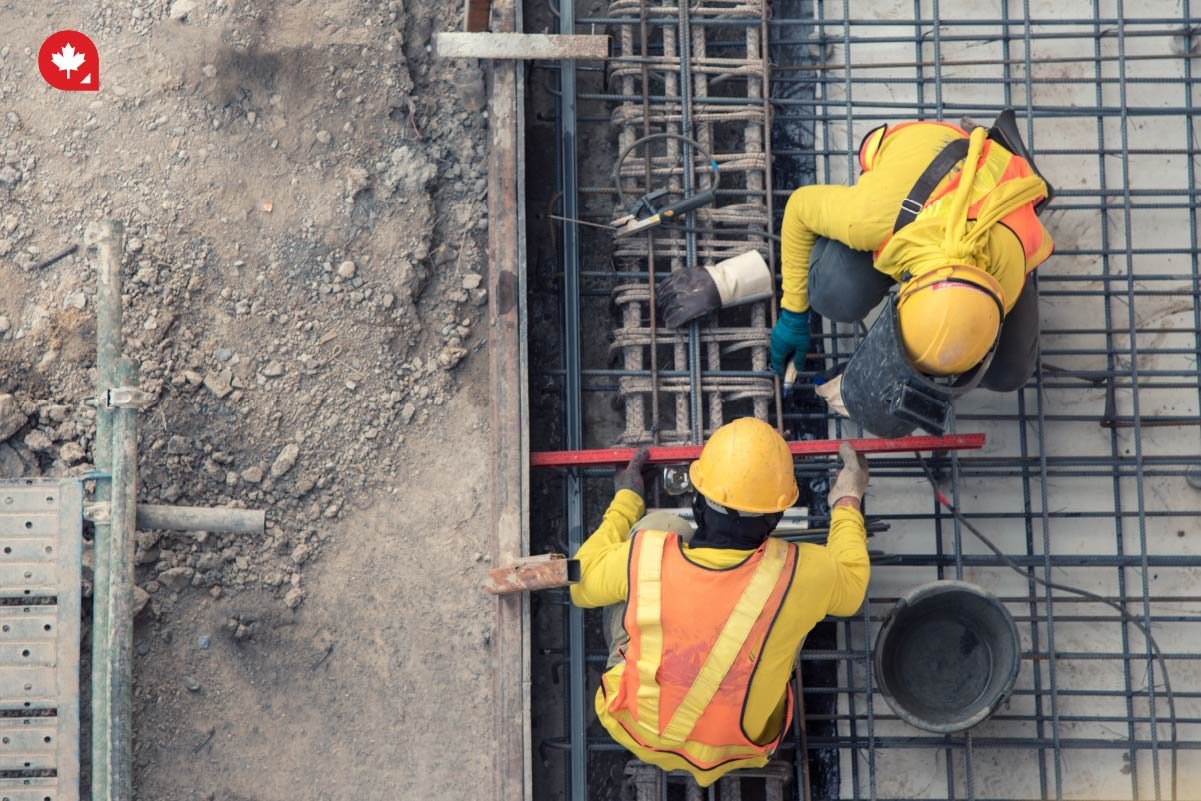As a civil engineer, you always seek opportunities to grow personally and professionally. What if you're told that Canada might be your perfect destination? It's true. With its robust infrastructure projects, Canada is a land of promise for civil engineers. Civil engineering jobs in Canada are highly sought after due to the country's commitment to building and maintaining a modern, efficient infrastructure system. So why not consider migrating to Canada as a civil engineer?
The question is, how do you navigate this process? What are the primary steps, and what are the benefits? In this guide, you'll learn everything you need about the path to immigrating to Canada as a civil engineer. This guide will equip you with all the necessary information, from the different programs available to you to job prospects, benefits, and more.
How to Immigrate to Canada as a Civil Engineer

As a civil engineer, you're classified under Canada's National Occupational Classification (NOC) as NOC 21300. Under this code, you can apply to the following programs.
Express Entry
The Express Entry System is Canada's most popular immigration pathway. Started in 2015, the Express Entry system helps skilled workers and their families become permanent residents of Canada in as little as six months. Learn more about Express Entry.
As a civil engineer, there are two programs you're best suited for.
Federal Skilled Worker Program
The Federal Skilled Worker Program (FSWP) is one of the three under Canada's Express Entry system. It is designed for skilled workers who do not live in Canada but wish to immigrate.
To qualify for this program, you must meet certain criteria. These include having at least one year of continuous full-time (or equivalent part-time) work experience in the last ten years in a skilled occupation, such as civil engineering. Learn more about the Federal Skilled Worker Program.
Canadian Experience Class
The Canadian Experience Class (CEC) is another program under the Express Entry system. This program is for skilled workers with Canadian work experience who want to become permanent residents.
To be eligible for this program, you must have at least one year of full-time (or equivalent part-time) skilled work experience in Canada in the three years before applying. Learn more about the Canadian Experience Class.
Provincial Nominee Programs (PNPs)
Provincial Nominee Programs (PNPs) are another pathway for civil engineers looking to immigrate to Canada. These programs allow provinces and territories in Canada to nominate individuals who wish to immigrate to Canada and who are interested in settling in a particular province.
Each province and territory have its own PNP, each with its requirements. Here are some of the best PNPs for civil engineers:
- Alberta Accelerated Immigration Pathway (AAIP)
- British Columbia Provincial Nominee Program (BCPNP)
- Ontario Provincial Nominee Program (OINP)
- Manitoba Provincial Nominee Program (MPNP)
- Nova Scotia Nominee Program (NSNP)
- New Brunswick Provincial Nominee Program (NBPNP)
- Saskatchewan Immigrant Nominee Program (SINP)
- Newfoundland and Labrador Provincial Nominee Program (NLPNP)
- Prince Edward Island Provincial Nominee Program (PEI PNP)
Pilot Programs for Civil Engineers
Besides the Express Entry and PNP programs, Canada has several pilot programs that could be an excellent opportunity for civil engineers looking to immigrate. These programs are designed to address specific labor market needs in some areas of Canada.
For example, the Atlantic Immigration Pilot (AIP) is a pathway to permanent residence for skilled workers who want to work and live in one of Canada's Atlantic Provinces: Newfoundland and Labrador, Prince Edward Island, Nova Scotia, and New Brunswick. AIP is designed to stimulate economic growth in Canada's Atlantic provinces by attracting skilled workers. AIP allows skilled workers to be nominated and fast-tracked through the immigration process to one of Canada's Atlantic provinces.
AIP allows immigrant applicants with job offers to apply for Canadian permanent residence while working in the Atlantic region. Since its introduction, the Atlantic provinces have been increasingly able to fill AIP immigration quotas, welcoming about 6,000 newcomers each year. The Atlantic provinces urgently need civil engineers, making it a good opportunity for civil engineers to immigrate to Canada through AIP.
A skilled worker must get an employment offer from someone designated through the program to be eligible for AIP. Employers interested in participating in AIP must apply to become designated employers. As a designated employer, a business can hire foreign nationals without obtaining a Labour Market Impact Assessment (LMIA), a certification stating that no one in Canada is a good fit for your prospective job.
Designated employers must assist employees hired through the pilot with settlement in their province of residence. Learn how to find your route to Canada through the Atlantic Immigration Pilot Program.
Work Permits for Civil Engineers
There are also work permit options for civil engineers who wish to work in Canada temporarily. For instance, the Temporary Foreign Worker Program (TFWP) allows Canadian employers to hire foreign nationals to fill temporary labor and skill shortages when qualified Canadian citizens or permanent residents are unavailable.
It's important to note that a work permit does not give you permanent resident status in Canada. However, it can lead to permanent residence through the Canadian Experience Class program. Learn how to apply for a Canadian work permit.
Top Provinces for Civil Engineering Jobs in Canada

As stated earlier, the demand for civil engineers in Canada is high. This is due to a combination of factors, including an aging workforce and an increased focus on infrastructure development.
Moreover, civil engineers in Canada work in various sectors, including construction, transportation, and government. Whether you're interested in designing bridges or highways, working in water resources, or environmental engineering, there are plenty of opportunities for civil engineers in Canada.
Alberta
Alberta, home to Canada's oil sands, strongly demands civil engineers. Civil engineers in Alberta work on various projects, including oil and gas infrastructure, transportation infrastructure, and municipal services.
Ontario
Ontario, Canada's most populous province, also offers numerous opportunities for civil engineers. With its bustling cities and sprawling suburban communities, civil engineers in Ontario work on projects ranging from road and bridge construction to water treatment and waste management.
British Columbia
British Columbia, known for its stunning natural landscapes, needs civil engineers to help manage and protect its resources. Civil engineers in British Columbia work on projects such as water management, transportation infrastructure, and environmental protection.
How to Obtain Professional Certification in Canada
To work as a civil engineer in Canada, you need to be licensed by the engineering regulatory body of the province or territory where you plan to work.
Step 1: Have Your Qualifications Assessed
The first step is to have your qualifications assessed. The Canadian Council of Professional Engineers does this to ensure that your education and experience meet Canadian standards.
Step 2: Apply for Membership
Once your qualifications have been assessed, you can apply for membership with the engineering association in the province or territory where you plan to work.
Step 3: Canadian Engineering Accreditation Board (CEAB) Exam
You must pass the CEAB exam, which tests your knowledge of Canadian engineering principles.
Step 4: Work Experience
To become a licensed professional engineer in Canada, you need at least four years of work experience, with at least one year of experience in Canada.
Step 5: Professional Practice Exam (PPE)
The final step is to pass the PPE, which tests your understanding of professional practice and ethics.
The Benefits of Working as a Civil Engineer in Canada

Working as a civil engineer in Canada could be the step forward your career is looking for. Here's why.
High Demand
The demand for civil engineers in Canada is high. According to a report from Engineers Canada, there will be a significant shortage of civil engineers in the country over the next decade. This means there are plenty of job opportunities for domestic and international civil engineers. This map shows the most in-demand occupations in each province to help you find where you're needed most.
Quality of Life
Canada consistently ranks as one of the best countries in the world for quality of life. This includes factors such as safety, education, and healthcare. Learn more about life in Canada.
Diverse Work Opportunities
Civil engineering in Canada is a diverse and dynamic field. As a civil engineer in Canada, you can work on various projects, such as designing and constructing bridges, highways, airports, and water treatment plants. In addition, Canada's focus on sustainable and environmentally friendly infrastructure provides unique challenges and opportunities for innovative civil engineering.
Pathway to Permanent Residence
Several immigration programs mentioned above offer a pathway to permanent residence for civil engineers in Canada.
FAQs
How do I Immigrate to Canada as a Civil Engineer Quickest Way?
If you want to immigrate to Canada as a civil engineer, quickest way is through the Express Entry system, specifically the FSWP or the CEC.
Which Civil Engineering Specialization is In Demand in Canada?
Here are some of the most in-demand civil engineering specializations in Canada:
Structural Engineering
Structural engineering is one of Canada's most in-demand specializations in civil engineering. Structural engineers are responsible for designing and analyzing the structural integrity of buildings, bridges, and other structures.
Geotechnical Engineering
Geotechnical engineering is also in demand in Canada. Geotechnical engineers are responsible for designing foundations, retaining walls, and other structures built into or on top of the ground.
Environmental Engineering
Environmental engineering is another in-demand specialization in Canada. Environmental engineers are responsible for designing and implementing systems to protect the environment, such as water treatment plants and waste management systems.
Water Resources Engineering
Water resources engineering is also in demand in Canada. Water resources engineers are responsible for designing and managing water supply, distribution, and wastewater treatment systems.
Construction Engineering
Construction engineering is also in demand in Canada. Construction engineers manage projects, completing them on time and within budget.
Electrical Engineering
Electrical engineering is also a sought-after engineering position in Canada.
Mechanical Engineering
Mechanical engineering is also a sought-after engineering position in Canada.
What is the Civil Engineering Salary in Canada?
Civil engineers in Canada earn a competitive salary. According to Canada's Job Bank, the average civil engineer earns around CAD 83,850 annually.
Build Your Future in Canada
Having read this comprehensive guide, you now understand the path to immigrating to Canada as a civil engineer. From understanding the demand for civil engineers in Canada to exploring the different immigration programs, uncovering the benefits, and the steps to becoming professionally certified, you're now well-equipped to embark on this exciting journey.
Remember, the first step is often the hardest and most rewarding. Immigrating to a new country is a significant decision, but it can be a smooth and successful journey with the right information and guidance. So take that first step today; before you know it, you could start a new chapter of your life in Canada.
If you're ready to explore the opportunities in Canada, don't hesitate to contact immigration professionals who can help guide you. The future is bright for civil engineers in Canada, and could be your future too. Good luck on your journey!




